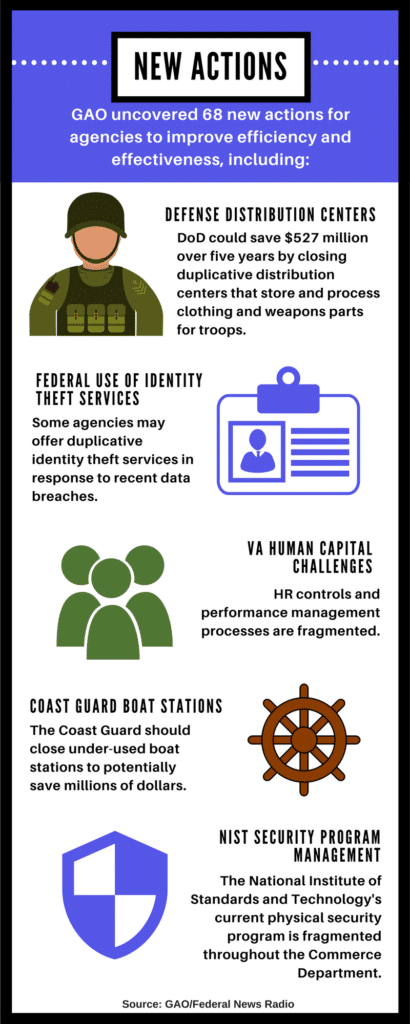
Do feds have an incentive to help their agencies uncover waste and find cost savings?
The Government Accountability Office uncovered 68 new actions agencies could take to improve or eliminate overlapping and duplicative processes and programs.
Agencies and Congress need to give federal employees more incentives to identify overlapping federal programs or broken processes, the Government Accountability Office says.
In its eighth annual report to Congress, GAO on Thursday identified 68 new actions that federal agencies or Congress could take to improve government efficiency and find more financial savings.
GAO has made 724 total recommendations since 2011, when GAO first began to identify opportunities where agencies could reduce duplication, overlap and fragmentation. Agencies have fully closed 52 percent and partially closed 24 of those recommendations. Together, fully or partially addressing those recommendations have reaped $178 billion in financial benefits so far, GAO said.
But lack of follow-up is the fatal flaw for agencies and members of Congress, and it’s why federal organizations still haven’t addressed 48 percent of GAO’s recommendations.
“[For] the recommendations that have not been implemented, quite frankly, we’re leaving tens of billions of dollars on the table in savings that could be made,” GAO Comptroller General Gene Dodaro told the House Oversight and Government Reform Committee.
Seven agencies have at least 25 open actions from GAO. The Defense Department has the most of any other agency, with 74 unaddressed or partially unaddressed recommendations. GAO flagged several new defense programs this year but focused its attention on two in particular.
By closing some its defense distribution centers, which store and process clothing and weapons systems repair parts for troops, the Pentagon could save about $527 million over five years. GAO also sees some duplication and overlap at Army and Marine Corps depots and Navy shipyards.
House lawmakers acknowledged agencies’ progress on eliminating some duplicative programs and processes, but they questioned whether federal organizations had the tools to motivate their employees to uncover wasteful spending and do something about it.
“What incentive is there for a government employer or agency to save taxpayers’ money? What incentive is there? Is there any today?” Rep. Rod Blum (R-Iowa) said.
In theory, agencies’ performance management systems should encourage and reward employees for their good work, Dodaro said.
“What we do is prevail upon people’s commitment to public service and to be good stewards,” he said. “For example at GAO, I reward our people based upon what we’re able to do … to save taxpayers’ money. There has to be a good reward system in place to do that. It doesn’t exist throughout the federal government, though.”
 But Dodaro said he isn’t confident that employees at other agencies have the same incentives.
But Dodaro said he isn’t confident that employees at other agencies have the same incentives.
“I’m not sure I could say that about the rest of the federal agencies and departments,” he said. “We’ve said that some of the performance management approaches in the federal government, the civil service system, [are] outdated. They’re not aligned properly with modern compensation systems, modern classification systems and need to be revamped.”
But Congress has a role to play too, Dodaro said. GAO sees positive change when Congress holds oversight hearings and works with agencies together to address their challenges.
GAO also noted congressional push back as the main reason behind the Coast Guard’s failure to close some boat stations that have overlapping search and rescue coverage. The Coast Guard has tried eight times since 1973 to close some stations, but members have intervened.
But congressional committees often fail to follow up after their hearings on a particular topic, Dodaro said. The Senate in the mid-2000s held a series of hearings about the challenges with the security clearance process, he recalled.
“They held hearings either every quarter or six months,” Dodaro said. “There was a series. People knew from the agencies that it wasn’t like, ‘Gee, I just have to get through this hearing and it’s going to be over with [and] they’ll forget about it.’ You had follow-up hearings. You had follow-up meetings with the agency officials. … There has to be a commitment to follow through until you know that the problem’s solved.”
Lack of follow-up is a significant problem for the Veterans Affairs Department, which has 25 total unaddressed or partially met recommendations from GAO. It added two items from VA to the latest duplication report: the department’s human capital management system and its medical supplies procurement process.
“They need leadership,” Dodaro said of VA. “I’m very worried about the Veterans [Affairs Department]. They have some of the most entrenched management problems in the federal government, that’s why we put them on the high-risk list. They’re making efforts to come up with a plan now, but it’s been three years since we put them on the list. They really haven’t finalized a good plan to come off the list. We’re working with them, they’re making progress. I don’t want to say that they’re not. But there needs to be more urgency to deal with the problems over there.”
Dodaro also expressed some concern about vacancies at VA. His words of concern came on the same day that Rear Adm. Ronny Jackson announced his decision to withdraw his name from consideration for VA secretary.
Other top positions, such as the department’s health leader and chief information officer, are also vacant.
Copyright © 2024 Federal News Network. All rights reserved. This website is not intended for users located within the European Economic Area.
Nicole Ogrysko is a reporter for Federal News Network focusing on the federal workforce and federal pay and benefits.
Follow @nogryskoWFED





